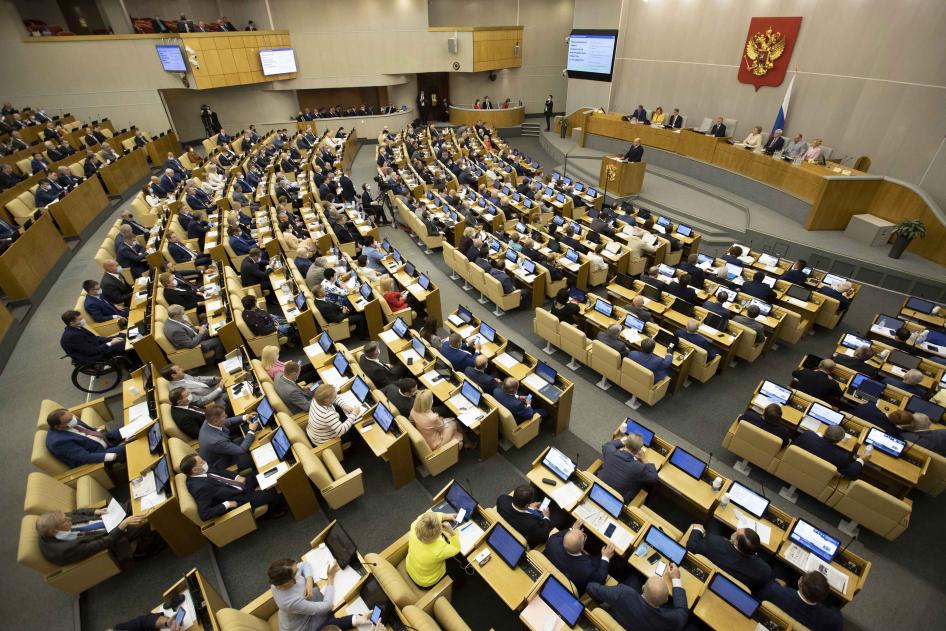(Berlin, December 20, 2022) – Russia’s lower house of parliament has adopted a bill that would provide effective immunity for certain crimes committed in occupied areas of Ukraine, in violation of Russia’s international legal obligations, Human Rights Watch said today.
The bill, which the State Duma adopted unanimously in its first reading on December 13, 2022, seeks to impose the Russian criminal code and code of criminal procedure in Russia-occupied areas of Donetska, Luhanska, Zaporizka, and Khersonska regions. It mandates dropping criminal cases and overturning convictions against those who committed crimes prior to September 30 while acting “in the interests of the Russian Federation” in those regions. These crimes would presumably include war crimes and grave human rights abuses, and would cover Russian officials and their proxies.
The bill will become law pending a second and third reading in the Duma, adoption by the Federation Council, the parliament’s upper chamber, and President Vladimir Putin’s signature.
“Russia’s proposed new law would ensure domestic impunity for Russian officials and their proxies who have committed war crimes and grave abuses in Russian-occupied territories of Ukraine,” said Rachel Denber, deputy Europe and Central Asia director at Human Rights Watch. “The bill shows utter disregard for Russia’s obligations under the Geneva Conventions and international human rights law.”
If adopted, the bill would also deny damages to those who had been unlawfully prosecuted in Russian-occupied territories.
In September, Putin claimed to annex four Russia-occupied areas in Ukraine’s Donetska, Luhanska, Zaporizka, and Khersonska regions. Days before, Russian authorities purportedly held “referendums” in these areas, with hastily staged “voting,” in some cases at gunpoint. Similar to the claimed referendum in Russian-occupied Crimea in 2014, these exercises hold no legal value and do not provide a basis for annexation or transfer of sovereignty. Russia remains an occupying power in these regions under the Fourth Geneva Convention, which continues to protect the civilian population.
Russian officials and their proxies responsible for crimes committed in occupied areas after September 30 would presumably be shielded by Russia’s persistent unwillingness to prosecute war crimes and other violations of international law committed by its forces, Human Rights Watch said.
Human Rights Watch has documented numerous grave violations of international law by Russian forces and their proxies in Ukraine’s occupied territories, including apparent war crimes, human rights abuses, and possible crimes against humanity, notably torture, enforced disappearances, extrajudicial killings, sexual violence, and the forcible transfers of civilians.
The bill violates Russia’s obligations under international humanitarian law and international human rights law. Article 64 of the Fourth Geneva Convention provides that in situations of occupation, the penal law and other local laws with rare exception remain in effect. Imposing Russia’s criminal code and code of criminal procedure is unlawful. Russia also has an obligation under international humanitarian law to investigate and prosecute alleged war crimes by its forces or which were committed on the territory it controls.
The bill also violates article 2 of the International Covenant on Civil and Political Rights, which guarantees a remedy to anyone whose rights have been violated, including through the courts. Absolving those responsible of any responsibility will deny justice to the victims and their families.
The International Criminal Court (ICC) has jurisdiction in Ukraine. On March 2, the ICC prosecutor opened an investigation into alleged serious crimes in Ukraine following a request by a group of ICC member countries.
“Russia should drop this immunity bill instead of licensing further lawlessness,” Denber said.









